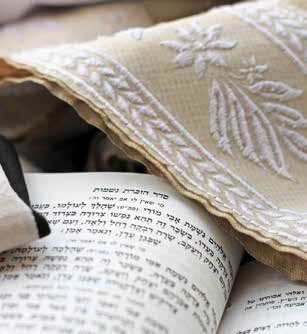The Making of a Kohen
Our elderly kohen died.
This event was a great loss for the synagogue of my childhood in the Philadelphia of the mid-1950s. It also created quite a dilemma. How was the congregation going to replace him?
Please understand. The elderly kohen was of my grandparents' generation. He was "shomer Shabbos" and relatively conversant in the technicalities of Jewish ritual. The majority of the congregants were my parents' age—married couples in their late thirties and early forties who stuffed the afternoon Hebrew School and the barmitzvah roster with a plethora of post-war baby boomers.
It was going to be difficult to find from among this bunch a kohen who fit the criteria -"religious," a shul-goer who could daven, knew for certain that he actually was a kohen, could learn the priestly ritual, and could at least repeat the three phrases of the Priestly Blessing in Hebrew when cued word by word by the Chazan.
Probably most of the congregants couldn't care less if a replacement kohen were to be found. But some cared deeply. Outside Israel kohens go up to "duchen" or bless the congregation only on the three major festivals and the High Holidays. The "pro-ducheners" wanted a kohen for the holidays.
So, out of desperation, they approached Max.
Max was a combat veteran of World War II who had settled in our neighborhood with his wife and children. He still retained a strong military bearing and kept his not-yet-thinning hair in a closely cropped crew cut. He outwardly seemed to be a tough guy, but his interest in community activities revealed a deeper, softer side.
He was the Pack Master of our cub scout pack, which was sponsored by and met in our synagogue. I forever picture him at pack meetings standing there in his khaki uniform, like a drill sergeant at boot camp, controlling a hundred little boys in blue-and-gold uniforms with yellow bandanas, and dink caps on their heads. He always wore over-the-ankle black lace-up shoes. We kids would say that it was because he was a paratrooper in the War and he hurt his ankles from jumping out of airplanes and landing hard. He was a kind of heroic figure, at least in our young minds.
Max happened to be a kohen.
The Ritual Committee came to him and begged him to be the synagogue's kohen and to stand before the congregation at the appropriate times and bless them.
Max at first refused. He said it would be hypocritical of him. He was not "shomer Shabbos." He kept kosher only at home, but not away. He didn't come to synagogue often. Although he could physically make the priestly gesture with his fingers, he did not feel himself spiritually worthy to bless the people. How could they possibly make him the synagogue's kohen?
Max went to see the rabbi.
He was told that this was meant to be. That when a kohen goes up to "duchen," he is transformed by the act and becomes the kohen and is qualified to bless the people.
Max hesitantly and modestly accepted the role.
But Max was not to be a hypocrite. He slowly became someone who ate only kosher at home and away. He willed himself with military discipline to become "shomer Shabbos." He came to synagogue regularly and mastered the davening.
In later years, when as a young married man, I would go to Philadelphia to visit my parents, I would see Max at the synagogue. In those years, Max seemed like the stereotypical "old man" that you thought of as having always been religious and always at the shul.
But I knew there was a great deal more depth and sensitivity and history to Max the Kohen.
Even now, I think of our growing up over the years, standing before Max as he blessed us in Hebrew:
"May the Lord bless thee and keep thee;
May the Lord cause the light of His countenance to shine upon thee and be gracious unto thee;
May the Lord lift up His countenance unto thee and grant thee peace."
I think of Max, "alav hashalom," from time to time to this day. These days, I am one of the "old men" who frequent the synagogue.
Max need not have worried about his worthiness to bless us. He is fixed in the consciousness of many of us Overbrook Park baby boomers for his blessings and for the impression he left behind.
His memory is the blessing.
I am sure of it.








Comments